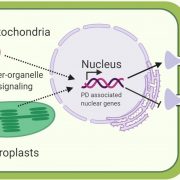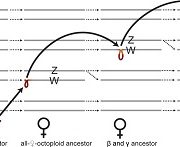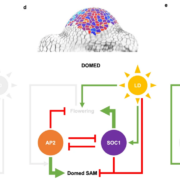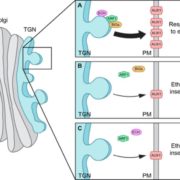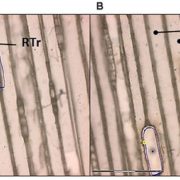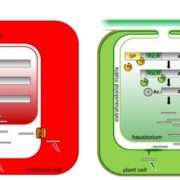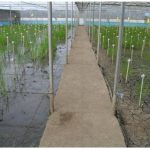Microtubule-associated proteins regulate fruit shape in tomato
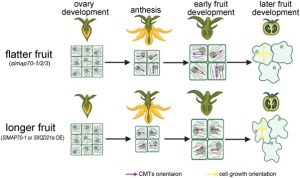 Microtubule binding proteins are important in determining fruit shape by driving changes in microtubule arrangement. However, in depth molecular studies on these in tomato (Solanum lycopersicum) have been limited. Here, Bao et al. investigated the microtubule binding protein Microtubule-Associated Protein 70 (MAP70), which is highly expressed in developing tomato fruits. Knocking out map70-1 and its homolog map70-2 with CRISPR/Cas9 led to flatter tomato fruits due to a reduction in fruit length and width. They labelled microtubules in the map70-1/map70-2 mutant with the microtubule marker GFP-MAP65-1 and used laser scanning confocal microscopy to look at microtubule organisation in endocarp cells. At an individual cell level, the mutant had more-ordered microtubules than the wild type, whereas at the supracellular level microtubule orientation was more varied, resulting in a lack of coordination in the expansion of different cells and hence flatter fruits. Beyond this they used yeast-2-hybrid, and bimolecular complementation to show that MAP70-1 interacts with the scaffold protein IQD21a. This interaction stabilizes microtubules and affects the dynamic rearrangement of microtubules during fruit development. Interestingly, an unrelated paper in Nature Plants by Li et al. found that elongated tomato fruits are more crush-resistant and amenable to mechanical harvesting, with the elongated shape conferred by alterations in cell division patterns. (Summary by Rose McNelly @Rose_McN) Plant Cell 10.1093/plcell/koad231
Microtubule binding proteins are important in determining fruit shape by driving changes in microtubule arrangement. However, in depth molecular studies on these in tomato (Solanum lycopersicum) have been limited. Here, Bao et al. investigated the microtubule binding protein Microtubule-Associated Protein 70 (MAP70), which is highly expressed in developing tomato fruits. Knocking out map70-1 and its homolog map70-2 with CRISPR/Cas9 led to flatter tomato fruits due to a reduction in fruit length and width. They labelled microtubules in the map70-1/map70-2 mutant with the microtubule marker GFP-MAP65-1 and used laser scanning confocal microscopy to look at microtubule organisation in endocarp cells. At an individual cell level, the mutant had more-ordered microtubules than the wild type, whereas at the supracellular level microtubule orientation was more varied, resulting in a lack of coordination in the expansion of different cells and hence flatter fruits. Beyond this they used yeast-2-hybrid, and bimolecular complementation to show that MAP70-1 interacts with the scaffold protein IQD21a. This interaction stabilizes microtubules and affects the dynamic rearrangement of microtubules during fruit development. Interestingly, an unrelated paper in Nature Plants by Li et al. found that elongated tomato fruits are more crush-resistant and amenable to mechanical harvesting, with the elongated shape conferred by alterations in cell division patterns. (Summary by Rose McNelly @Rose_McN) Plant Cell 10.1093/plcell/koad231


